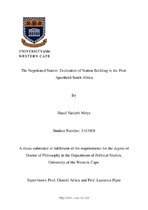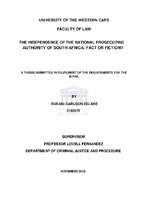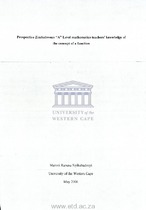| dc.contributor.advisor | Africa, Cherrel | |
| dc.contributor.author | Moya, Hazel Nasiphi | |
| dc.date.accessioned | 2021-10-18T11:27:17Z | |
| dc.date.available | 2021-10-18T11:27:17Z | |
| dc.date.issued | 2021 | |
| dc.identifier.uri | http://hdl.handle.net/11394/8524 | |
| dc.description | Philosophiae Doctor - PhD | en_US |
| dc.description.abstract | The demise of apartheid presented South Africa with an opportunity to rebuild itself from its painful racist past to become a home to all those who live in it. This was done through a process of nation-building, which took the form of a multicultural civic nation, affectionately known as the Rainbow Nation, that embraces diverse cultures while affirming that individual citizens have equal rights. This thesis argues that the building of the Rainbow Nation has been somewhat successful, but more on a symbolic than institutional level, and that enduring forms of racial exclusion from socio-economic well-being pose the greatest threat to constructing a united, multicultural nation of civic equals. | en_US |
| dc.language.iso | en | en_US |
| dc.publisher | University of Western Cape | en_US |
| dc.subject | Nationalism | en_US |
| dc.subject | Rainbow nation | en_US |
| dc.subject | Radical nationalism | en_US |
| dc.subject | Post-apartheid | en_US |
| dc.subject | South Africa | en_US |
| dc.title | The negotiated nation: Evaluation of nation building in the post-apartheid South Africa | en_US |
| dc.rights.holder | University of Western Cape | en_US |




